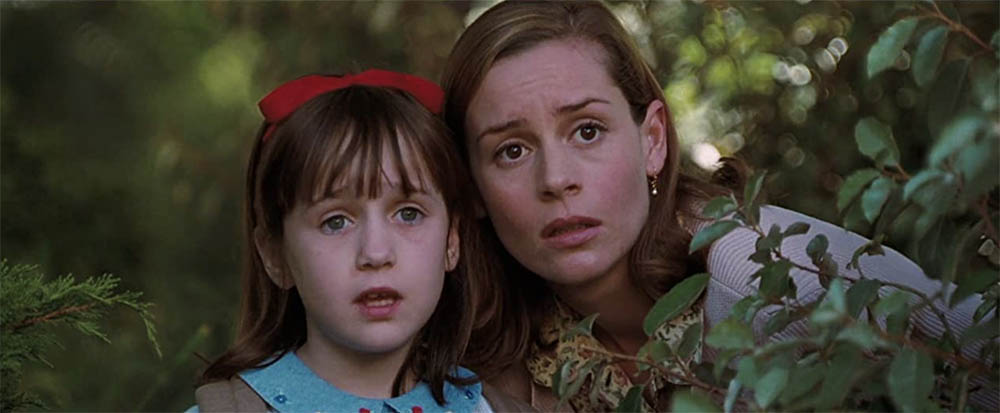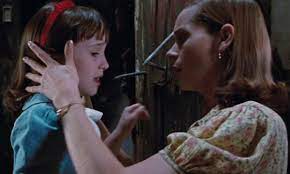Matilda (1996)

Matilda (1996) Review – A Magical Tale of Empowerment and Whimsy
Matilda (1996), directed by Danny DeVito and based on Roald Dahl’s beloved novel, is a charming and whimsical film that has stood the test of time as one of the most beloved children’s classics. The story of a young girl with extraordinary intelligence and telekinetic powers, surrounded by neglectful parents and a cruel headmistress, is a delightful mix of fantasy, humor, and emotional depth. With standout performances, particularly by Mara Wilson as Matilda, and a heartwarming message of empowerment, Matilda remains a cherished film for viewers of all ages. This review will explore the film’s plot, performances, themes, and its lasting cultural impact.
Plot Summary
Matilda follows the life of a young girl, Matilda Wormwood (Mara Wilson), who is incredibly intelligent but is consistently mistreated by her neglectful parents, Mr. and Mrs. Wormwood (Danny DeVito and Rhea Perlman). Despite their lack of care, Matilda thrives intellectually, developing a brilliant mind and an innate sense of independence. When she starts attending school, she forms a close bond with her kind teacher, Miss Honey (Embeth Davidtz), who quickly recognizes Matilda’s extraordinary abilities.
However, the school is ruled by the sadistic Miss Trunchbull (Pam Ferris), a tyrant who terrorizes the children. As Matilda’s telekinetic powers grow, she begins using them to stand up to Miss Trunchbull and help Miss Honey reclaim her inheritance, all while teaching the school and her family that love, kindness, and intelligence can prevail over cruelty and injustice.
Themes and Symbolism
Empowerment and Self-Discovery
The central theme of Matilda is empowerment, particularly the empowerment of young people to overcome adversity. Matilda’s journey is one of self-discovery as she realizes her full potential and uses her abilities to challenge the oppressive forces around her. The film encourages children to trust in their own intelligence and to have the courage to stand up for what is right, regardless of the obstacles they face.
Good vs. Evil
The classic theme of good vs. evil is personified in the characters of Matilda and Miss Trunchbull. Matilda’s kindness, intelligence, and compassion are in stark contrast to Trunchbull’s cruelty and tyrannical rule. The film demonstrates that even the most powerful villain can be overthrown by the quiet strength of goodness, making it a powerful allegory for resilience and justice.
The Power of Love and Kindness
Matilda’s relationship with Miss Honey is the emotional core of the film. Their bond represents the transformative power of love and kindness, showing that even in the face of adversity, support from those who believe in you can make all the difference. The film reinforces the idea that empathy and kindness are just as powerful as intelligence and strength.
Performances
Mara Wilson as Matilda Wormwood
Mara Wilson delivers an iconic performance as Matilda, embodying both the sweetness and strength of the character. Her portrayal of a girl who is not only brilliant but also filled with compassion and a desire for justice is both heartwarming and empowering. Wilson’s ability to convey Matilda’s vulnerability and determination makes her one of the most beloved child performances in cinema history.
Pam Ferris as Miss Trunchbull
Pam Ferris is terrifying and brilliant as Miss Trunchbull, the film’s primary antagonist. Her portrayal of the sadistic headmistress is both over-the-top and unsettling, adding to the film’s humor and dark edge. Ferris brings the character to life in a way that is both menacing and absurd, making Trunchbull one of the most memorable villains in children’s cinema.
Danny DeVito and Rhea Perlman as Mr. and Mrs. Wormwood
Danny DeVito, who also directed the film, plays the neglectful and absurd Mr. Wormwood. His comedic timing and exaggerated performance make him both ridiculous and unlikable, providing the perfect foil to Matilda’s intelligence. Rhea Perlman’s Mrs. Wormwood is equally shallow and indifferent, contributing to the film’s satirical take on family dynamics.
Embeth Davidtz as Miss Honey
Embeth Davidtz’s portrayal of Miss Honey is heartfelt and genuine. Her kindness and belief in Matilda provide the emotional heart of the story, making her a perfect counterpart to Matilda’s strength. Miss Honey’s support and care help Matilda realize her potential, highlighting the importance of nurturing relationships in the face of adversity.
Cinematography and Visual Style
The cinematography of Matilda is whimsical and colorful, reflecting the fantastical nature of the story. The film uses exaggerated visual techniques to highlight Matilda’s intelligence and powers, with creative camera work during her telekinetic moments. The contrast between the dark, oppressive world of the Wormwood family and the warm, supportive environment of Miss Honey’s home is stark, emphasizing the difference between cruelty and kindness.
Danny DeVito’s direction brings a sense of playful energy to the film, while still grounding it in emotional reality. The film’s vibrant set design and exaggerated costumes contribute to its fantastical tone, while still maintaining an underlying sense of warmth and heart.
Music and Sound Design
The music by David Newman is lively and playful, capturing the whimsical nature of the story while also providing emotional depth during the film’s more poignant moments. The soundtrack enhances the emotional beats of the story, from moments of triumph to moments of sadness and introspection. The music is a perfect complement to the film’s tone, underscoring the balance between lighthearted humor and more serious themes.
Cultural Impact and Legacy
Since its release, Matilda has become a timeless classic, particularly for those who grew up watching it. Its themes of empowerment, resilience, and the triumph of good over evil continue to resonate with audiences of all ages. The film’s characters, especially Matilda and Miss Trunchbull, have become iconic in popular culture, and lines like “You are a teacher, Miss Honey. You’re supposed to be nice,” are still quoted today.
The film’s success also led to a successful stage musical adaptation, further cementing its cultural relevance. The character of Matilda has become a symbol of strength and intelligence, inspiring countless young viewers to believe in their potential.
Final Verdict
Matilda (1996) is a magical, heartwarming film that captures the essence of Roald Dahl’s beloved book while adding a layer of cinematic charm. With standout performances, especially from Mara Wilson and Pam Ferris, the film is both a visual delight and an emotional journey. The themes of empowerment, justice, and kindness are timeless, making Matilda a must-watch for audiences young and old.
For anyone looking for a feel-good, inspiring film with humor and heart, Matilda is an unforgettable classic. It’s a story that encourages us all to embrace our inner strength and to never stop believing in the power of good.











